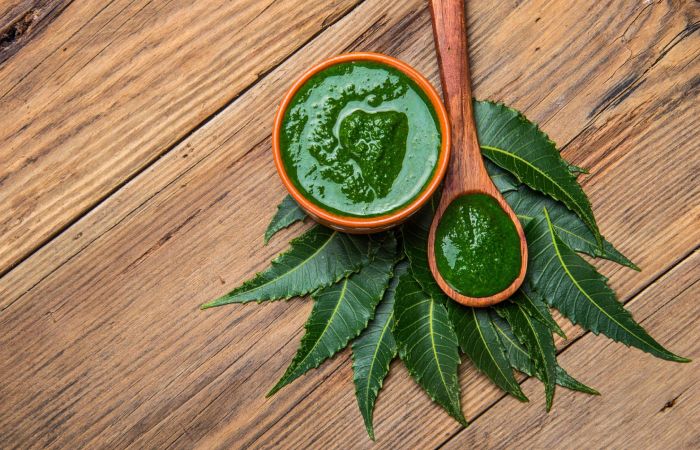Introduction
The use of neem hair mask and scalp can bring many significant benefits, and in what comes. We will review its benefits and multiple ways to apply them.

Here are the highlights of your wait once you start using the neem hair mask:
Resistance and Treatment of Dandruff
One of the potential benefits of a neem hair mask is that it may help resist the hair cortex, and the benefits of neem hair in this regard are often attributed to the following:
Neem has natural fungal-resistant properties, as the leading cause of the dandruff is believed to be some fungus species, such as candida and Malassezia.
It contains neem compounds that may contribute directly to the scalp to alleviate some of the symptoms associated with the cortex.
Such as inflammation, skin itching, and scalp irritation.
The potential ability of neem oil to stimulate the restoration of the scalp to its acid baseline may help prevent future dandruff infection.
Get Rid of Lice
One of the potential benefits of a neem hair mask is that it may help to rid hair of lice. Following a scientific study in which the effectiveness of neem in the treatment of lice in children was tested.
It was noted that neem extract might help eliminate lice and their eggs in no more than ten days without any complications.
Because of its potential benefits in this regard, it is possible to find neem a common ingredient in anti-lice shampoos.
Other Benefits
Neem musk made from neem leaves or oil extracted from it may also have many other benefits for hair, such as:
Improving the health and nutrition of damaged hair from the inside, mainly due to the richness of neem with beneficial fatty acids and vitamin e.
Hair damage may occur due to many factors, such as pollution, thermal instruments, and exposure to sunlight.
Resist the appearance of early graying, or resist its spread in the hair after it occurs.
Especially with the richness of neem with antioxidants important for graying resistance.
Other benefits, such as hair blowing and moisturizing hair.
Ways to Apply the Neem Hair Mask
The benefits of the neem hair mask can be collected through many recipes and methods, as follows:
Natural Neem Wash for Hair
Boil a handful of green neem leaves in a pint of water, then leave the neem boiled aside until it drops, then rinse the hair.
Neem and Curd
Mix equal servings of neem leaf powder and curd.
Then apply the neem and milk mixture to the scalp, washing after 20 minutes.
Neem and Coconut Oil
Boil a handful of neem leaves with a small amount of coconut oil.
Then add 2-3 drops of lemon juice to the mixture when cooled.
Use neem, coconut oil, and lemon to massage the scalp at night and wash the scalp in the morning.
Neem hair mask to recipes to strengthen hair and resist damage
It is possible to use neem hair to enhance it and resist damage by following the following recipes:
Neem oil and Almond Oil
Mix equal amounts of almond and neem oil, then massage the scalp with this oil blend, washing the scalp of oils after two hours.
Neem and Honey
Boil approximately 45 sheets of neem leaves in water, then leave the leaves soaked in water for a whole night.
After which the leaves are taken and ground, add a spoonful of honey.
Then apply the blend to the hair and wash after 30 minutes.
Neem Oil and Jojoba Oil
Mix a spoonful of neem oil with two tablespoons of jojoba oil and a few drops of lavender oil, set aside for 2 hours.
Then massage the scalp with the neem oil mixture and other lubricants for 10 minutes, washing the mixture after half an hour.
Neem Hair Mask without Additives
small amounts of neem powder are mixed with water, then massage the scalp with this coarse paste, and wash after 30 minutes.
Neem Damage to Hair and Scalp
These are some of the damages to the neem and its oil to the hair and scalp:
Irritation of the scalp, mainly if neem oil is used directly on the scalp for long periods.
Whether abstract neem oil or neem oil mixed with other oils.
The emergence of problems in the fur area.
Especially when neem oil is used excessively or when people with an allergy use neem to the neem plant, such as the dry scalp, blisters, and thali.
Allergic reactions may be embodied in various symptoms, such as redness, skin itching, and swelling.


